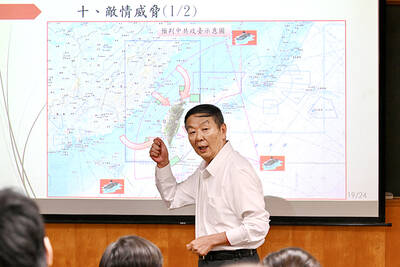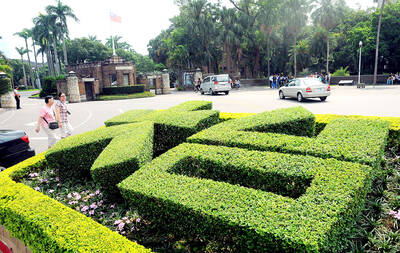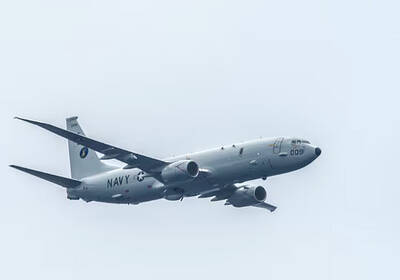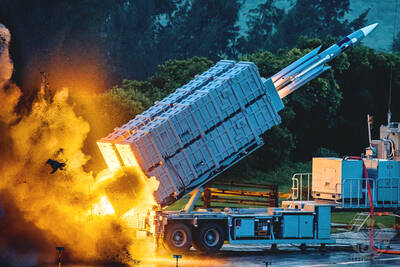China yesterday expressed its dissatisfaction with President Tsai Ing-wen’s (蔡英文) inaugural address, describing it as an “incomplete test paper.”
China’s Taiwan Affairs Office issued a statement in response to Tsai’s speech, in which many people were looking for clues about the future of Taiwan-China ties.
China said it noticed that the “new leader of the Taiwan authorities” mentioned that in 1992, the two institutions representing the two sides of the Taiwan Strait arrived at various joint acknowledgments and understandings through communication and negotiations.
Tsai also said her new government would continue to promote the stable and peaceful development of cross-strait relations based on existing realities and political foundations, the statement said.
However, Tsai did not clearly recognize the so-called “1992 consensus” nor agree to its core meaning, and she did not propose concrete ways to guarantee the stable and peaceful development of the cross-strait relationship, it said.
“On the fundamental question of the nature of cross-strait relations that people on the two sides of the Strait are most concerned about, [Tsai] adopted a murky attitude,” the statement said.
“This is an incomplete test paper,” it said.
Cross-strait exchanges have slowed since Tsai and the Democratic Progressive Party (DPP) scored resounding victories in presidential and legislative elections on Jan. 16, achieving a complete transformation of power in Taiwan.
Tsai has refused to accept the “1992 consensus,” seen by the government of former president Ma Ying-jeou (馬英九) as a tacit agreement between the two sides of the Strait that there is only “one China,” with the two sides free to interpret what that means.
Official Chinese news outlets largely snubbed Tsai’s inauguration, with searches of her name and “Taiwan” blocked on social media.
China’s state-run media were almost mute about the inauguration, with no coverage at all on national TV or major newspapers, such as the People’s Daily, the Chinese Communist Party’s mouthpiece. Xinhua news agency took nearly three hours from when she was sworn in to report the fact in a 22-word dispatch in English.
For several hours, searches for “Taiwan” or “Tsai Ing-wen” on Chinese microblogging site Sina Weibo both returned the message: “Sorry, no relevant result is found,” although her name was later unblocked.
In an editorial, the Global Times — a newspaper owned by the People’s Daily group that often takes a nationalistic tone — said Tsai’s assumption of power heralded “a new era for a cross-strait region that is characterized by uncertainty.”
DPP rule will make Taiwan “take a larger step away from the mainland politically,” it said. “Certain people are still holding on to the fantasy that ‘soft independence’ might be workable.”
“Perhaps a new round of contention is inevitable to completely drive the topic of Taiwan independence away,” it added.
Beijing has been sending assertive messages across the Taiwan Strait since Tsai was elected. It has warned against any attempt to formally declare independence and the Chinese military has mounted at least three landing exercises in the country’s southeast this month — widely seen as a threat to Tsai not to rock the boat.

RETHINK? The defense ministry and Navy Command Headquarters could take over the indigenous submarine project and change its production timeline, a source said Admiral Huang Shu-kuang’s (黃曙光) resignation as head of the Indigenous Submarine Program and as a member of the National Security Council could affect the production of submarines, a source said yesterday. Huang in a statement last night said he had decided to resign due to national security concerns while expressing the hope that it would put a stop to political wrangling that only undermines the advancement of the nation’s defense capabilities. Taiwan People’s Party Legislator Vivian Huang (黃珊珊) yesterday said that the admiral, her older brother, felt it was time for him to step down and that he had completed what he

Taiwan has experienced its most significant improvement in the QS World University Rankings by Subject, data provided on Sunday by international higher education analyst Quacquarelli Symonds (QS) showed. Compared with last year’s edition of the rankings, which measure academic excellence and influence, Taiwanese universities made great improvements in the H Index metric, which evaluates research productivity and its impact, with a notable 30 percent increase overall, QS said. Taiwanese universities also made notable progress in the Citations per Paper metric, which measures the impact of research, achieving a 13 percent increase. Taiwanese universities gained 10 percent in Academic Reputation, but declined 18 percent

CHINA REACTS: The patrol and reconnaissance plane ‘transited the Taiwan Strait in international airspace,’ the 7th Fleet said, while Taipei said it saw nothing unusual The US 7th Fleet yesterday said that a US Navy P-8A Poseidon flew through the Taiwan Strait, a day after US and Chinese defense heads held their first talks since November 2022 in an effort to reduce regional tensions. The patrol and reconnaissance plane “transited the Taiwan Strait in international airspace,” the 7th Fleet said in a news release. “By operating within the Taiwan Strait in accordance with international law, the United States upholds the navigational rights and freedoms of all nations.” In a separate statement, the Ministry of National Defense said that it monitored nearby waters and airspace as the aircraft

UNDER DISCUSSION: The combatant command would integrate fast attack boat and anti-ship missile groups to defend waters closest to the coastline, a source said The military could establish a new combatant command as early as 2026, which would be tasked with defending Taiwan’s territorial waters 24 nautical miles (44.4km) from the nation’s coastline, a source familiar with the matter said yesterday. The new command, which would fall under the Naval Command Headquarters, would be led by a vice admiral and integrate existing fast attack boat and anti-ship missile groups, along with the Naval Maritime Surveillance and Reconnaissance Command, said the source, who asked to remain anonymous. It could be launched by 2026, but details are being discussed and no final timetable has been announced, the source